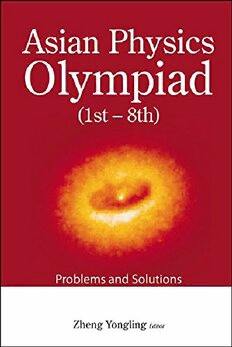
Asian Physics Olympiad: 1st-8th, Problems and Solutions PDF
Preview Asian Physics Olympiad: 1st-8th, Problems and Solutions
Asian Physics Olympiad (1st – 8th) Problems and Solutions 7255 tp.indd 1 9/8/09 4:17:00 PM TThhiiss ppaaggee iinntteennttiioonnaallllyy lleefftt bbllaannkk Asian Physics Olympiad (1st – 8th) Problems and Solutions Editor Zheng Yongling Fudan University, China East China Normal World Scientific University Press 7255 tp.indd 2 9/8/09 4:17:00 PM Published by East China Normal University Press 3663 North Zhongshan Road Shanghai 200062 China and World Scientific Publishing Co. Pte. Ltd. 5 Toh Tuck Link, Singapore 596224 USA office: 27 Warren Street, Suite 401-402, Hackensack, NJ 07601 UK office: 57 Shelton Street, Covent Garden, London WC2H 9HE British Library Cataloguing-in-Publication Data A catalogue record for this book is available from the British Library. ASIAN PHYSICS OLYMPIAD (1ST–8TH) Problems and Solutions Copyright © 2010 by East China Normal University Press and World Scientific Publishing Co. Pte. Ltd. All rights reserved. This book, or parts thereof, may not be reproduced in any form or by any means, electronic or mechanical, including photocopying, recording or any information storage and retrieval system now known or to be invented, without written permission from the Publisher. For photocopying of material in this volume, please pay a copying fee through the Copyright Clearance Center, Inc., 222 Rosewood Drive, Danvers, MA 01923, USA. In this case permission to photocopy is not required from the publisher. ISBN-13 978-981-4271-43-1 (pbk) ISBN-10 981-4271-43-8 (pbk) Printed in Singapore. ZhangJi - Asian Phys Olympiad 1st-8th Probs &1 Solu.pmd 8/28/2009, 3:06 PM Editor ZHENG Yongling Fudan University, China Original Authors National Coaches of the host country of Asian Physics Olympiad during 2000 - 2007 Copy Editors N I Ming East China Normal University Press, China ZHAN G Ji World Scientific Publishing Co. , Singapore ZHAO Ju nli East China Normal University Press, China TThhiiss ppaaggee iinntteennttiioonnaallllyy lleefftt bbllaannkk Preface The Asian Physics Olympiad (abbreviated to APhO) is currently the premier physics competition held annually for Asian pre-university or senior high school students. It is modeled after the International Physics Olympiad (IPhO), and demands a similar level of intellectual capability from the participants. The only difference between APhO and IPhO is that each participating country can send eight students at most to compete in APhO instead of five in IPhO. The age of the participants should not exceed twenty on June 30th of the year of the competition. The idea of creating the Asian Physics Olympiad was first proposed in August 1995 by Dr. Waldemar Gorzkowski, then the President of International Physics Olympiads who regretfully passed away in 2007 during the 38th IPhO held in Isfahhan, Iran. The proposal aimed to promote the quality of science education and attract students to study physics that was much needed in increasing science manpower for developing the new century information economy in Asia region. Technically, APhO was proposed to be held two months before IPhO and it would act as a warm-up competition for the worldwide IPhO. The idea of APhO was welcomed by many Asian countries. Unfortunately, the implement of the proposal was deferred by the Asian financial crisis happened in 1997 through 1998. In 1999, Professor Yohanes Surya with full support from Indonesia government announced to inaugurate the First APhO during the 30th IPhO in Italy. Right after this announcement, Chinese Taipei declared to host the Second APhO in 2001 and was soon followed by Singapore as the host of the Third APhO in 2002 and Thailand as the host of the Fourth APhO in 2003. In the ensuing years, the Fifth to the Ninth APhO were organized smoothly in turn by Vietnam, Indonesia (twice), Kazakhstan, China, and Mongolia from 2004 to 2008, respectively. The number of participating countries has grown from original ten to around twenty. The effect of APhO is very fruitful and conspicuous. The statistical grade data of the past eight years of the global competition of IPhO shows that close to one half of gold medals were won by the students from APhO participating countries. I am pleased to see the publication of the collection of the APhO problems viii Asian Physics Olympiad Problems and Solutions and solutions. These problems were deliberately formulated by each of the organizing countries. Normally, it had to group together about a dozen of physics professors to form an academic committee and took about one to two years to accomplish the demanding task. Reading and comprehending these problems and solutions can greatly help readers in understanding physics laws deeper and strengthening their analytical and reasoning capability in solving problems. This book is filled with many good wishes and efforts devoted to nourishing our new generations. Professor Ming-Juey Lin, Ph. D. Secretary of Asian Physics Olympiads Preface/vii Minutes of the First Asian Physics Olympiad Theoretical Competition/3 Experimental Competition/15 Minutes of the Second Asian Physics Olympiad Theoretical Competition/28 Experimental Competition/50 Minutes of the Third Asian Physics Olympiad Theoretical Competition/64 Experimental Competition/84 Minutes of the Fourth Asian Physics Olympiad Theoretical Competition/102 Experimental Competition/112 Minutes of the Fifth Asian Physics Olympiad Theoretical Competition/127 Experimental Competition/145 Minutes of the Sixth Asian Physics Olympiad Theoretical Competition/166 Experimental Competition/185 Minutes of the Seventh Asian Physics Olympiad Theoretical Competition/207 Experimental Competition/226 Minutes of the Eighth Asian Physics Olympiad Theoretical Competition/244 Experimental Competition/273 Appendices Statutes/293 Syllabus/ 302 Team List/307
